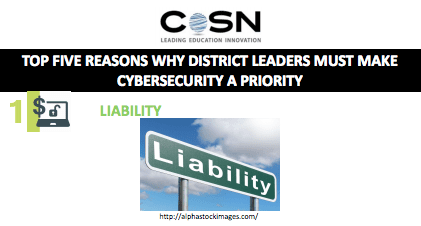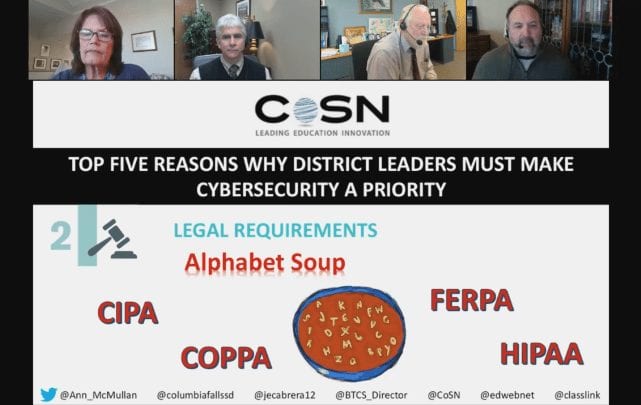5 Reasons to Address Cyber Security
Of course cyber security is necessary in education. Schools have valuable information to protect for both students and employees. However, as financial and physical security issues arise, cyber security can fall down the list. As Ann McMullan, Project Director, CoSN Empowered Superintendents Program reminded attendees at a recent edWebinar, cyber attacks are increasing in K-12 from phishing attempts to outright hacks. Steve Bradshaw, Superintendent, Columbia Falls School District 6; Juan Cabrera, Superintendent, El Paso ISD; and Dr. Gary Lilly, Superintendent, Bristol Tennessee City Schools joined McMullan for, “CyberSecurity: A Critical School District Priority.” Sharing both personal experiences and insights from across K-12, they implored school leaders to create a comprehensive cyber security plan now.
Even with recent high-profile incidents, cyber security can seem abstract and non-urgent. The presenters offered five reasons to make it a priority.

- Liability: Districts and school leaders can be held liable for network breaches. Individual superintendents and principals can even be sued. School management needs to take reasonable steps to ensure protection beyond data sharing policies. Lilly explained that his schools, for instance, have frequent administrative access audits to ensure they can’t see information, like social security numbers, they shouldn’t. Bradshaw recommended all districts have cyber security insurance so that the school can take care of problems as they arise.
- Legal Requirements: Many leaders know about COPPA and FERPA, but they forget about HIPAA. School records contain health information on all IEP students, employees, and any medical needs shared with the nurse or school officials. These records need similar levels of protection. In addition, Cabrera pointed out that as schools develop anywhere, anytime access; as they add more cyber components to school operations; and as they use more services that highlight interoperability, schools are even more exposed. They need to not only stay on top of federal and state laws but continually review their vulnerabilities.
- Professional Reputation: As evidenced by recent incidents, stories about data hacks stay in the news for many cycles. This can harm the reputation of the school and its leaders. All presenters have heard of school officials losing their jobs from data breaches.
- Teaching and Learning: When the school network goes down temporarily, classes are momentarily disrupted. Cabrera pointed out, though, that for schools with most materials in the cloud, a hacked network and any subsequent outages for repair can halt learning for days or longer. With few on-site licenses, educators and students will have no access to their materials. More important, a compromised network can also impact school operations like payroll.
- Student Digital Records: Not all attacks are about stealing data. Some have focused on changing information, which can impact college and employment applications.
When each presenter shared their cyber security challenges and why they’ve taken a lead role, they also emphasized that it’s not the sole responsibility of IT, and that school leaders need support at the highest levels.
“So for us, in terms of whether it’s changing the passwords or doing more training. It’s making this issue more visible at the board level so that the CTO is not the only one involved,” said Cabrera.“What we do for training is we’re involving our HR…the cyber training has to become a part of the core work of the district…that it elevates the level of importance because we centralize it and don’t make it just an IT issue.”
This edWeb broadcast was co-hosted by CoSN and sponsored by ClassLink.
This article was modified and published by EdScoop.
About the Presenters
Steve Bradshaw, Superintendent at Columbia Falls School District 6, in Montana, started teaching in Hardin, Montana in 1976. He taught speech and psychology before starting his administrative career. Steve has been an assistant high school principal for six years, a high school principal for 16 years, and is in his 17th year as a superintendent. Including Hardin, Steve has worked in five school districts: Annette Island School District in Metlakatla, Alaska; Red Lodge School District in Red Lodge, Montana; Sitka School District in Sitka, Alaska; and his current district.
Juan E. Cabrera was named Superintendent at El Paso Independent School District in Texas in 2013. Prior to EPISD, Juan served as a school law attorney. He is a former teacher but spent 20 years away from the classroom working as a technology attorney and software executive. Juan graduated from Texas A&I University and the University of Texas School of Law. He has also completed programs at the London School of Business and the Harvard Negotiation Project. Additionally, he has completed the ALAS Superintendents Leadership Academy. Juan was selected as 2015 Texas Latino Superintendent and was one of 100 Superintendents to participate in the National ConnectED Superintendents Summit at the White House. Under his leadership, EPISD was one of only 80 districts to join the League of Innovative Schools and one of 10 districts to join the CASEL network. EPISD was also selected as one of eight Texas districts to join TEA’s System of Great Schools.
Dr. Gary Lilly, Superintendent at Bristol Tennessee City Schools in Tennessee since 2009, has been an educator for 24 years. He began his career with Bristol Tennessee City Schools as a middle school teacher. Prior to becoming superintendent, Dr. Lilly held a variety of roles with the district, including Curriculum Specialist, Director of Technology, and Principal. Under his leadership, Bristol Tennessee City Schools has embraced personalized learning through an effort that includes providing laptops for students to use at school and at home. In 2015, Dr. Lilly was recognized as one of the Top 30 Technologists, Transformers, and Trailblazers by the Center for Digital Excellence. In 2016, the district’s only middle school was identified as one of three exemplar programs in the state of Tennessee by the Partnership for 21st Century Learning. Bristol Tennessee City Schools was also named a #GoOpen Ambassador District by the U.S. Department of Education for their work developing and using open educational resources.
About the Host
Ann McMullan is a 34-year veteran educator who served as the executive director for educational technology in the Klein Independent School District, located just outside Houston, Texas until September 2013, when she and her family moved to Los Angeles, California. For 16 years Ann led the team in Klein ISD that provided professional development on technology and 21st century instructional strategies to over 4,000 professional educators serving over 50,000 students. During that time Ann also co-chaired the Texas Education Technology Advisory Committee which developed the Texas Education Agency’s Long Range Plan for Technology, 2006-2020.
Today, she is based in Los Angeles, California working as a public speaker, writer, and independent education consultant focused on supporting leadership, visioning and planning to meet the needs of today’s students. She is a frequent presenter at state, national and international education conferences. Ann serves as project director for CoSN’s Empowered Superintendents Program. She serves on the board of PowerMyLearning Los Angeles and on the advisory board of Project Tomorrow. In the fall of 2016 Ann co-authored and published Life Lessons in Leadership: The Way of the Wallaby.
Join the Community
Super-Connected is a free professional learning community on edWeb.net for school superintendents, district leadership, and aspiring district leaders.
ClassLink empowers your students and teachers with instant access to their learning resources. ClassLink® OneClick® includes a library of over 5,000 single sign-on apps and instant links to file folders at school and on Google, Office 365, and Dropbox cloud drives. ClassLink Roster Server easily and securely delivers class rosters to any publisher using open technology standards. ClassLink Analytics gives decision makers the usage data they need. Accessible from any computer, tablet or smartphone, ClassLink is ideal for 1to1 and Bring Your Own Device (BYOD) initiatives.
CoSN (the Consortium for School Networking) is the premier professional association for school system technology leaders. CoSN provides thought leadership resources, community, best practices and advocacy tools to help leaders succeed in the digital transformation. CoSN represents over 13 million students in school districts nationwide and continues to grow as a powerful and influential voice in K-12 education.






Comments are closed.